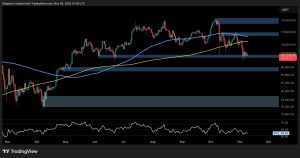Jo Johnson – the brother of the UK’s former PM, Boris Johnson – reportedly resigned from his advisory role in Bifinity (a payments technology company launched by Binance).
The world’s largest cryptocurrency platform has had several brushes with British regulators over the past few years. Despite the tension, the company aims to become a registered entity in the Kingdom sometime next year.
Johnson’s Departure
According to recent coverage by The Telegraph, Boris Johnson’s younger brother – Jo Johnson – has quit the advisory board of Binance’s subsidiary.
He and Britain’s former Minister for Culture, Communications and Creative Industries – Ed Vaizey (Lord Vaizey of Didcot), joined the company in September, highlighting Binance’s efforts to build trust between the crypto industry and the UK’s regulators and political elite. Lord Vaizey resigned from his post at Bifinity, too.
A Binance spokesperson said Johnson left the firm to become an Executive Chairman of the digital education platform – FutureLearn.
“He will be focusing on his new role within the digital learning platform and is looking to scale back other activities,” he added.
The United Kingdom has not been the most-welcoming destination for Binance. The Financial Conduct Authority (FCA) issued a warning against the exchange last summer, outlining that Binance Markets Limited “is not permitted to undertake any regulated activity in the UK.”
The company hired more people and enacted mandatory know-your-customer (KYC) requirements to complete the watchdog’s guidelines. The FCA announced a few months later that Binance handled the issue.
Nearly a year ago, Changpeng Zhao – CEO of the trading venue – said one of his firm’s goals is to become a registered cryptocurrency company in the UK in the following months. To do so, it might establish a separate venture called Binance UK, similar to the existing one in the United States.
Another Giant’s Fall or Simply FUD?
Centralized exchanges have been the subject of enhanced scrutiny ever since the collapse of FTX.
Binance topped up its Secure Asset Fund for Users (SAFU) to $1 billion and introduced an Industry Recovery Fund to assist rival companies with liquidity issues. It also released its Proof-of-Reserves system, assuring that when a user buys one bitcoin, Binance purchases one coin and holds it until the customer decides to sell or swap it for another asset.
The auditing company Mazars determined that Binance’s Bitcoin deposits were 101% collateralized as of the end of November.
Despite that, renewed rumors that the US DOJ might prosecute the exchange for allegedly facilitating money laundering procedures caused confusion among users, and some withdrew their assets from the platform.
Binance processed nearly $8 billion in daily withdrawals last week, but that did not affect its balance sheet or general operations. Zhao claimed that the wave of ongoing transactions was caused by FUD, assuring that the organization is financially stable, does not owe money to anyone, and has never misused customers’ funds.
The post Boris Johnson’s Brother Stepped Down From Binance’s Global Advisory Board (Report) appeared first on CryptoPotato.




















